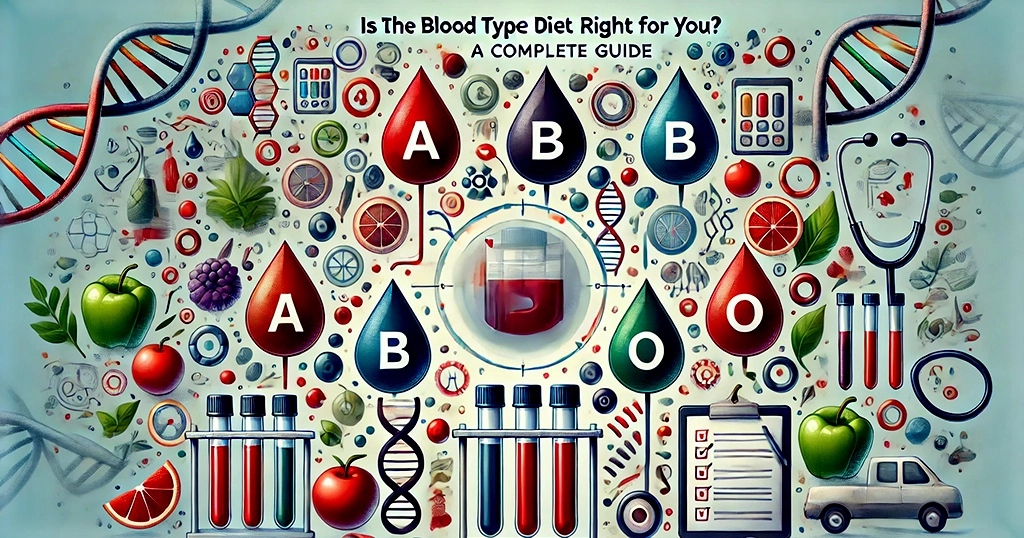Introduction
We know that humans have different blood types. Nowadays such a diet is popularly called a blood type diet. According to this diet, people with different blood group types should consume different foods. In this blog post, we will know what a blood type diet is, what its science is, and whether it is right for you or not.
What is the Blood Type Diet?
Who made the concept of blood type diet famous is Dr. Peter D’Adamo. He is believed that people with different blood groups (A, B, AB, and O) should follow different diets. The basic concept of this diet is that depending on your blood group, some foods can be beneficial, some neutral, and some harmful for you.
Blood Group A: Also known as Agrarian, is the diet in which you have to follow mostly a vegetarian diet. You should eat fruits, vegetables, beans, legumes, and whole grains. Avoiding red meat and dairy products will be good.
Blood Group B: Is called Nomadic; you will have to include dairy products in your diet. A balanced diet should include meat, dairy, grains, beans, fruits, and vegetables. It is advised to avoid chicken and corn.
Blood Group AB: known as Enigma, people of this group should follow a mixed diet (Blood Group A, Blood Group B). Seafood, tofu, dairy, beans, and grains are beneficial. Consume red meat as little as possible.
Blood Group O: Also called hunter, this is an old blood type that is recommended for your high-protein diet based on more meat, fish, and vegetables. Avoid grains, beans, and dairy.
Does science support the blood type diet?
Many studies say that there is no direct connection between blood group diet and health benefits. But many dietitians believe that a person’s blood group tells us about the efficiency of his digestive and immune systems. There is very little scientific evidence for this.
What are its benefits and drawbacks, and what should we eat?
Blood Group A:
Benefits: The immune system of people with blood group A is a little sensitive. A vegetarian diet is a great option for them.
Drawbacks: If you completely avoid dairy products and meat, then this will cause protein deficiency in your body. Vitamin B12 and iron deficiency can also occur.
Recommended foods:
- Soy
- Eggs
- Broccoli
- Fennel
- Carrots
- Pumpkin
- Blueberries
- Apricots
- Grapefruit
- Tofu
- Cherries
Foods to avoid:
- Beans
- Eggplants
- Tomatoes
Blood Group B:
Benefits: The digestive system of people with Blood Group B can process dairy products very easily, that is why they should consume dairy products in large quantities. They have the option of eating a lot of foods that are good for health.
Drawbacks: If these people follow a feminine diet, then food sensitivity (VTS) may develop in their body.
Recommended foods:
- Beetroot
- Cow’s milk
- Cottage cheese
- Yogurt
- Almonds
- Grapes
- Eggplant
- Peppers
- Kidney beans
- Cranberries
- Lamb
Foods to avoid:
- Chicken
- Corn
- Soy
- Lentils
- Watermelon
- Cauliflower
- Walnuts
- Lentils
- Eggs
- Figs
- Milk
- Yogurt
- Peanut butter
- Garlic
- Red wine
- Lamb
- Corn
- Chicken
- Bananas
- Poultry
- Kale
- Onion
- Spinach
- Olive oil
- Ginger
- Lamb
- Butter
- bananas
- Fish
- Mangoes
- Almonds
- Wheat
- Soybean oil
- Kidney beans
Conclusion
If you want to know how such bad habits like drinking too much tea effect our bodies, then please click here. If you want to know which four items boost your immune system, please click here. If you want to know the benefits of eating pomegranate, please click here or If you want to know Which 5 Nutrients Should Be In Our Children’s Food?, please click here. If you want to know Tips For reducing vitamin D deficiency, Please click here. If you want to know how eggs is benificial for our diet, please click here. If you want to know Potatoes Help In Weight Loss!, please click here. if you want to know about Brain Diet: Top 5 Superfoods, please click here. If you want to know about Diabetes Diet: 5 Types of Breads That Won’t Spike Your Sugar, please click here.
if you want to check more post like this, please visit : Infoblog BHARAT

Good information
Nice post 👍
Good
Nice pics